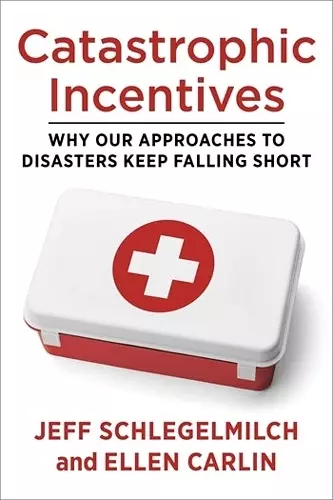Catastrophic Incentives
Why Our Approaches to Disasters Keep Falling Short
Ellen Carlin author Professor Jeff Schlegelmilch author
Format:Hardback
Publisher:Columbia University Press
Published:24th Oct '23
£100.00
Supplier delay - available to order, but may take longer than usual.

Silver Award Winner, 2024 Nonfiction Book Awards
Societies are vulnerable to any number of potential disasters: earthquakes, hurricanes, infectious diseases, terrorist attacks, and many others. Even though the dangers are often clear, there is a persistent pattern of inadequate preparation and a failure to learn from experience. Before disasters, institutions pay insufficient attention to risk; in the aftermath, even when the lack of preparation led to a flawed response, the focus shifts to patching holes instead of addressing the underlying problems.
Examining twenty years of disasters from 9/11 to COVID-19, Jeff Schlegelmilch and Ellen Carlin show how flawed incentive structures make the world more vulnerable when catastrophe strikes. They explore how governments, the private sector, nonprofits, and academia behave before, during, and after crises, arguing that standard operational and business models have produced dysfunction. Catastrophic Incentives reveals troubling patterns about what does and does not matter to the institutions that are responsible for dealing with disasters. The short-termism of electoral politics and corporate decision making, the funding structure of nonprofits, and the institutional dynamics shaping academic research have all contributed to a failure to build resilience.
Offering a comprehensive and incisive look at disaster governance, Catastrophic Incentives provides timely recommendations for reimagining systems and institutions so that they are better equipped to manage twenty-first-century threats.
At this critical crossroads in human history, Schlegelmilch and Carlin expose the cracks in how we prepare and respond to disasters and call on us to develop and execute strategies for achieving a more sustainable and resilient future. -- Shay Bahramirad, senior vice president of Engineering, Asset Management, and Capital Program, LUMA Energy, and president-elect of the Institute of Electrical and Electronics Engineers Power and Energy Society
This critical analysis offers fresh insight into the ways that the very structures we rely on to keep us safe from disasters are falling short. In exploring disincentives for readiness within and among sectors and the vulnerabilities they enable, the authors also provide a path forward and a reason to believe that a more resilient future is possible. -- Tom Daschle, commissioner, Bipartisan Commission on Biodefense and former Senate majority leader
A critical examination of recent events and our capacity to prepare and respond to them. With this work, the authors review the key drivers of disaster infrastructure, and the incentives that sustain them. As we reflect on the lessons of the COVID-19 pandemic and observe the landscape ahead, this book is a valuable resource. -- Nicolette Louissaint, senior vice president of policy, Healthcare Distribution Alliance
This is a true ‘must read’ for anyone interested in how we’ve managed large-scale disasters since the 9/11 attacks. Chronicling the evolution of key policies and protocols while still being an accessible and compelling story, it is an essential guide for professionals, students, and anyone interested in the safety and security of our world in the years to come. -- Irwin Redlener, MD, founding director, National Center for Disaster Preparedness, Columbia University
This book is an essential read to better understand why different sectors respond the way they do, and how that sets the stage for our own preparedness planning for surviving disasters. -- Les Stroud, survival expert and award-winning filmmaker and producer
- Commended for Nonfiction Book Awards 2024
ISBN: 9780231204224
Dimensions: unknown
Weight: unknown
264 pages